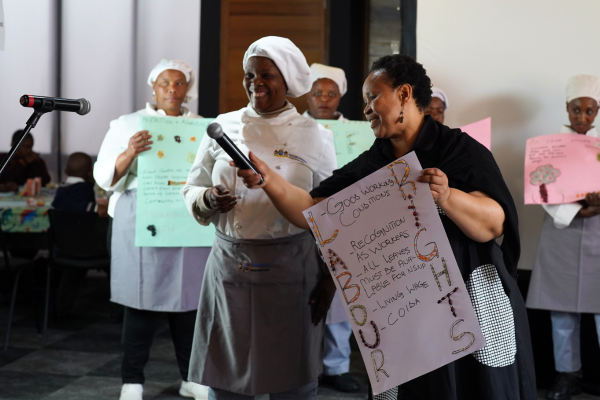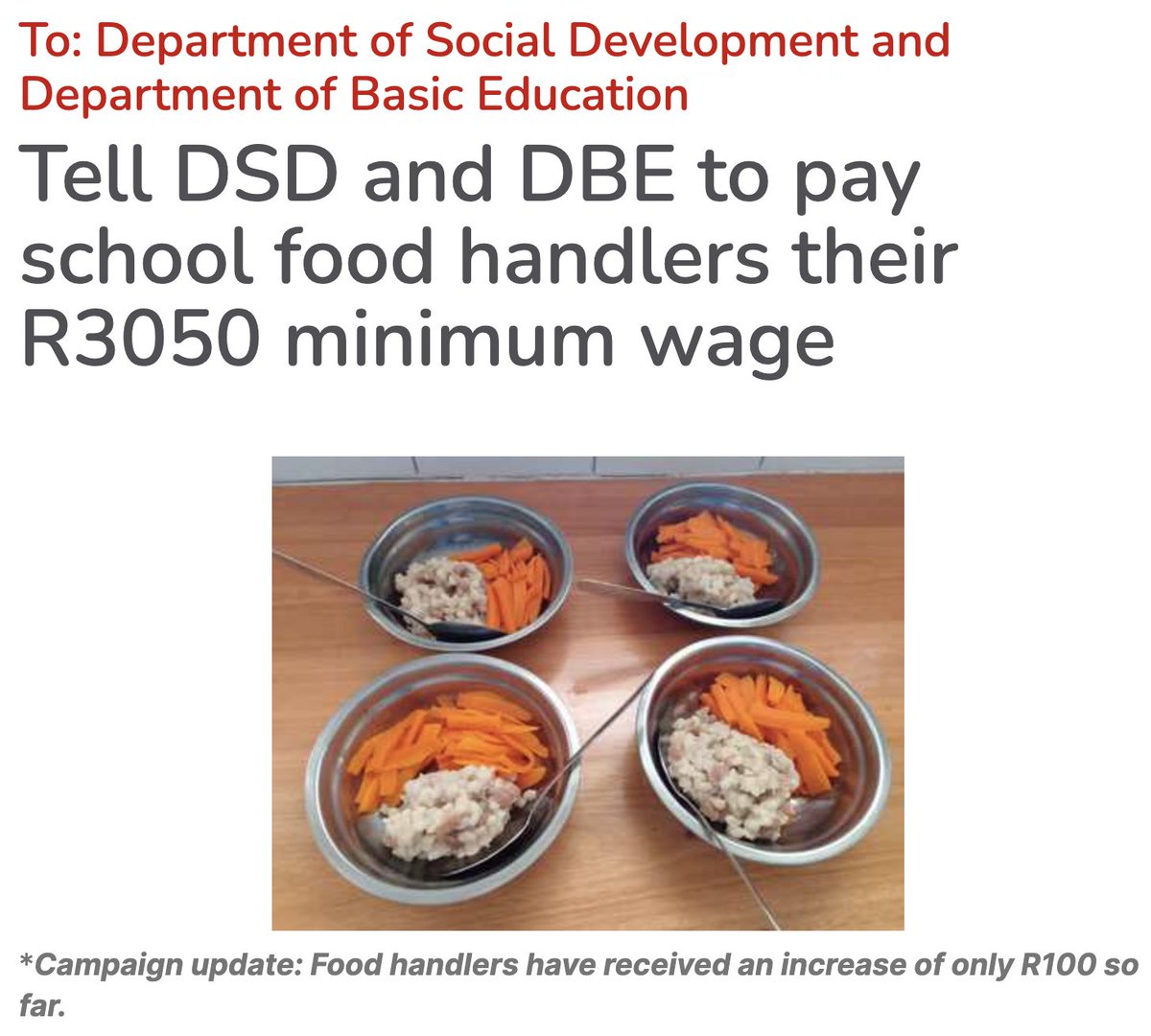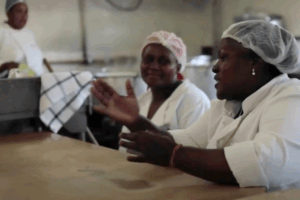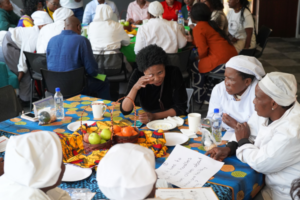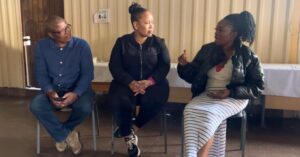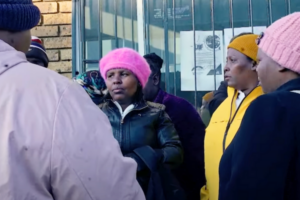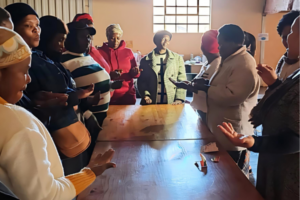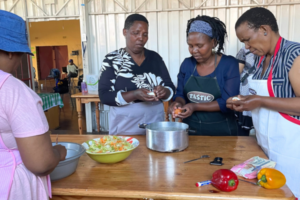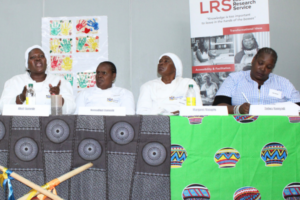In 2024, the LRS continued to support our group of Volunteer Food Handlers in Gauteng in their campaign for recognition and decent work under the National School Nutrition Programme (NSNP). Food handlers began their advocacy in 2021 through the PowerUp Initiative.
Every school day, more than 61,000 women rise before dawn to prepare meals for over 9.6 million learners in more than 20,000 schools. Their labour sustains the NSNP, which the government regularly praises as key to addressing hunger and malnutrition. Yet, these women, formally known as Volunteer Food Handlers, are routinely excluded from budget speeches and subsequent policy proposals.
Challenging exclusion in policy and national budget: 'We are not Tintswalo'
In February 2024, the Minister of Finance again lauded the NSNP in his national budget speech and did not acknowledge the women making it possible. These workers continue to be offered “work opportunities” through the Expanded Public Works Programme (EPWP) and receive a monthly stipend of R1 712, about 35% below the national minimum wage.
Just weeks earlier, the president’s State of the Nation Address (SONA) introduced Tintswalo, a symbolic child of democracy with access to opportunities and services denied during apartheid. For food handlers, the narrative felt far removed from their daily experience.
The first advocacy action of the food handlers was a response to the SONA and budget speech. LRS facilitated a space for food handlers to analyse the budget and SONA, using feminist popular education methods. Their reflections sparked a letter-writing campaign addressed to the president, exposing the disconnect between political promises and the lived realities of the women who prepare and serve meals in schools under the NSNP.
"I am not Tintswalo. I am Phumalela, a mother of three. When the president delivered the State of the Nation Address, I listened carefully to hear what he was saying about me as a woman. I did not hear anything about my job. I want to know how the work I do contributes to the state of the nation. I want to hear how the government plans to ensure we can continue feeding and supporting learners at school. I want my voice heard in NSNP decisions."
— Phumalela, Sebokeng
Food handlers shared the letters widely through WhatsApp. These letters formed part of an Amandla.mobi petition calling for the national minimum wage for Volunteer Food Handlers, and a Daily Maverick article advocating for valuing of care work.
Impact
- Volunteer Food Handlers have grown more confident in engagement with budgets, from household to national budgets.
- The Budget Justice Coalition and other groups are interested in the issue of food handler remuneration.
- Volunteer Food Handlers in Gauteng received two stipend increases, from R1780 to R2200.
- School-level advocacy led to kitchen upgrades and improved equipment in some schools.
Media coverage has seen an increasing interest in the working conditions and future prospects of the food handlers once their contract ends. For example, WiLPGSAI, a women’s empowerment group, offered learnerships in the gas industry to former food handlers.
Movement building, advocacy and alliance building
When the PowerUp project began in 2021, the group of Volunteer Food Handlers had no collective voice and were absent from discussions about NSNP, despite their central role. Over four years, their collective voice grew, and by the end of 2024, food handlers were actively exploring new forms of representation and accountability.
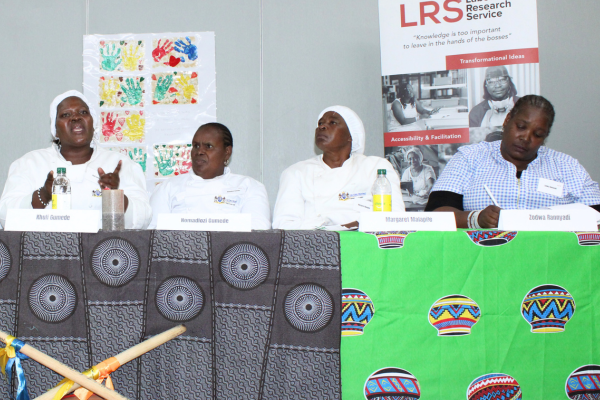
Volunteer Food handlers at a media conference in 2023 in Johannesburg.
The food handlers now have a broad forum with representation from four municipalities in Gauteng. At the national level, they engage through media, alliances with SADTU and NAPTOSA, and a thriving WhatsApp Group, which they use to share concerns, experiences, achievements and strategies, and as one handler put it, “to share love.” Between 2021 and 2023, advocacy focused on unions, communities, the media, and the Department of Labour (notably through the UIF campaign). In 2024, the food handlers built a broader alliance of stakeholders, laying the foundation for a national movement.
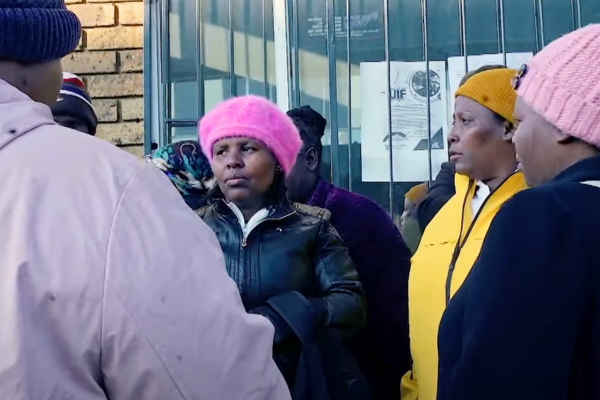
Former Volunteer Food Handlers outside the Vanderbijlpark labour office in Gauteng in 2023
Learning through practice
Central to our 2024 activities were embodied learning practices that consider that much of our learning is through doing, that the nature of the physical environment where the learning takes place is key and that learning needs to be an engaging and inclusive experience.
Supported by the LRS, the core group of Volunteer Food Handlers have monthly workshops and in many of these workshops cooking breakfast and lunch together is not only a social experience but also a learning process.
It is in this cooking process that food handlers experiment with indigenous and nutritious ingredients and food preparation. It is here that issues about food sovereignty and techniques for homegrown food are discussed.
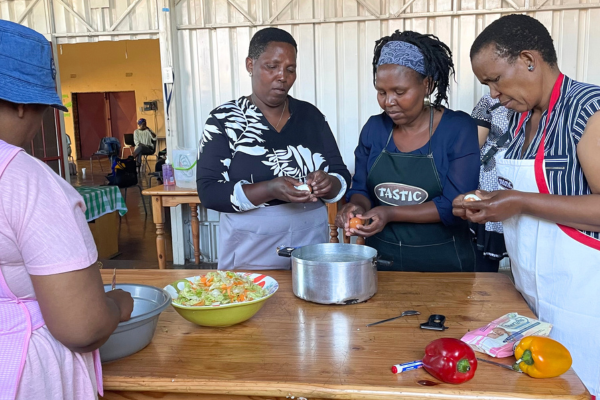
LRS-supported workshops offer food handlers in Gauteng meaningful opportunities for connection, learning, and growth.
Tools for strengthening the advocacy and alliance-building work of food handlers.
1. The Roundtable: Experts as “living books”
The roundtable gave food handlers access to a group of “living books”, experts in various fields whom they selected based on the knowledge areas they wanted to explore, validate or strengthen. The food handlers drew on the expertise as needed and were in control of the conversations. This roundtable was in preparation for the LRS colloquium.
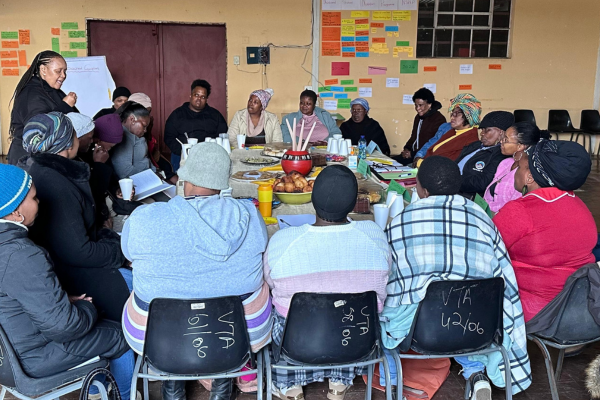
June 2024 | Gauteng Volunteer Food Handlers strengthened their campaign by engaging in a roundtable discussion with experts on labour rights, organising, nutrition, and more.
2. The Colloquium: “Food in school is a social justice issue”
In September 2024, LRS hosted a colloquium, “Food in School is a Social Justice issue” at Constitution Hill, where food handlers and learners led conversations on strengthening the NSNP and ensuring the rights of the volunteer food handlers as workers are met.
The event brought together a broad range of stakeholders, including: HEALA, Section 27, Amandla.mobi, SADTU, NAPTOSA, SAFTU, ILO representative, Webber Wentzel, Wits University, University of London, Five national ecological organisations, Friedrich Ebert Stiftung South Africa, Foundation for Human Rights, Community-based organisations from Gauteng, and the media.
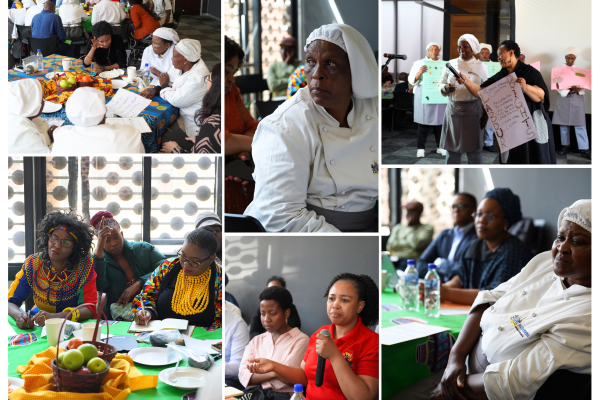
September 2024 | The colloquium marked a turning point, with food handlers stepping into their roles as advocates on a national platform. It amplified their voices, expanded networks, and a bold leap in collective empowerment and movement-building.
Impact
- Volunteer Food Handlers now see themselves as nutritional activists, a role that goes beyond their two-year contracts in the school. The nutritional activist identity continues to be about work but now this work is seen as contributing to the broader community beyond the school. Former food handlers in our network plan to use their expertise from working in the NSNP, to grow community gardens and initiate community kitchens. The nutritional activist identity shapes a broader movement building identity different from a workplace-focused trade union identity.
- Food handlers addressed the public for the first time at the HEALA Schools Food Environment Assembly, which was attended by 280 national stakeholders to explore ways to strengthen the NSNP.
- Trade unions at the colloquium acknowledged the need to represent food handlers in schools where they organise.
- Ecological groups at the colloquium identified synergies between their work and the potential role of NSNP and food handlers in strengthening the struggle for food sovereignty.
- Webber Wentzel is facilitating the formal negotiations of food handlers with the departments of basic education and employment and labour in 2025.
- LRS has a new partnership with the Foundation for Human Rights that provided a grant to support the work of the food handlers.
“The LRS Colloquium shed light on the systems involved in the NSNP and the social justice issues that not only accompany but also hinder good nutrition. Understanding the broader systemic failures helped HEALA understand the landscape and reevaluate its organisational demands. The asks from the Food Handlers for greater investment in staff and infrastructure are uniform to HEALA’s. This means training, access to fair wages, improved procurement, and a higher budget allocation.”
Petronell Kruger, Programme Manager at HEALA, a food justice advocacy coalition.
Making care work visible, recognised and remunerated
‘’We are seen but we are invisible (bayasibona kodwa asibonakali).’’
Volunteer Food Handler in the Vaal.
This statement from one of the food handlers captures their general feeling in 2021. The sense of not being seen extended from the Department of Education to the learners in the school.
Food handlers have become increasingly conscious of the reasons for this invisibility, from unequal gender norms that assign it to women, to economic systems that exclude it from formal value, a lack of supportive policy frameworks, and social perceptions reinforce the idea that care work is unskilled and not worthy of value.
Much of our work has been about valuing and making visible care work and the women who do the work. For example, On Women’s Day, food handlers compared a typical day of unpaid domestic work with that of a school food handler receiving a stipend. The activity sparked rich discussion on the skills, responsibility, and impact of care work, and what happens when care work is not done. It also highlighted how, within the Expanded Public Works Programme, roles like early childhood educators, community health workers, and food handlers remain among the lowest paid.
"The school expects us to act like superwomen, ensuring that children eat every day, even when we are sick. We must make the same 'plan' we make at home to receive praise and recognition once a year from our children and spouses."
Volunteer Food Handler in the Vaal.
“We grew up seeing our grandmothers grow food for the entire family, yet their labour was never regarded as work. When men do it, for example, as gardeners in domestic work, it suddenly becomes valuable and paid."
Volunteer Food Handler in the Vaal - Food Handlers advocate for the inclusion of school gardening in the curriculum to help learners value food production, take responsibility for their nutrition, and support community-led food sovereignty.
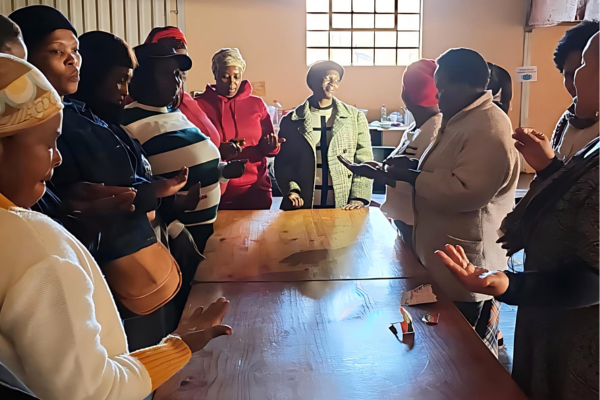
August 2024 | Women’s Day through the eyes of Volunteer Food Handlers in Gauteng.
Impact
- Volunteer Food Handlers know their location in the EPWP’s social sector and the importance of solidarity with other care workers.
- With support from the SAGE Fund, LRS is linking food handlers with ECD educators (via SADTU) and community health workers (via SACWF) to form a national care work platform.
- More food handlers feel empowered to challenge poor working conditions at the school level.
- There is growing clarity around what decent work looks like, and why they deserve the national minimum wage.
- Volunteer Food Handlers see themselves as women, workers, activists, political actors, and citizens. They have gained visibility in national struggles around labour rights and food sovereignty.
Key takeaways: Women care workers organising
- The increasing visibility of the challenges and struggles of the Volunteer Food Handlers is an important example for other women doing care work in the social sector of the Expanded Public Works Programme like early childhood development practitioners and community healthcare workers that collective voice and struggle and can contribute to shifting the attitude and value placed on care work.
- The Volunteer Food Handlers are bringing the issue of women and local food production into the public eye by showing how programmes like the NSNP can be more effective when sourcing locally produced food and relying on local indigenous forms of knowledge for strengthening food sovereignty.
- The increasing visibility of the Volunteer Food Handlers is increasing the visibility of care work more generally.
This article is extracted from a PowerUp Initiative report by LRS Gender Programme team.
Contact Nosipho Twala ([email protected]) and Nina Benjamin ([email protected]) to learn more about LRS support for care workers in the social sector of the Expanded Public Works Programme.
RELATED ARTICLES
- Unlocking the true value of women’s work in school nutrition
- Building a campaign to recognise and value the work of Volunteer Food Handlers
- Access Granted – Volunteer Food Handlers secure UIF benefits in a successful campaign
- Reflexive practice for effective lobbying and advocacy | Decolonising nutrition and valuing Volunteer Food Handlers to strengthen the NSNP (A presentation)
Good vibes: ‘Jabula’ (‘rejoice, be happy’) – A song by Volunteer Food Handlers expressing their commitment and passion to ensuring that all learners under the NSNP have access to the nutrition they need to thrive in school.


